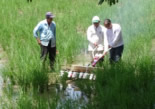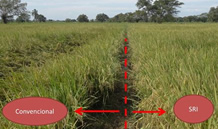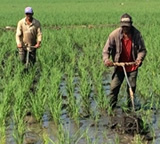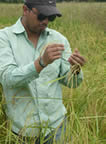COLOMBIA
[en español]
Overview of SRI in Colombia
Jorge Orlando Acosta Buitrago began SRI research in 2009 for the ingenieria agronómico degree at the Facultad de Ciencias Agropecuariasat of the University of Cundinamarca in Fusagasugá. His experiments, the first SRI research carried out in Colombia, were done in the municipality of Purification, Tolima, between July 2010 and August 2011. He evaluated the variety F733 under three types of management (organic SRI, and chemical SRI and mixed chemical/organic SRI) and compared them with the conventional direct seeding rice system. Although returns for SRI treatments were negative with conventional rice pricing despite 600% seed savings, returns were positive in the organic market. A 2013 article, El SICA orgánico en Colombia, published in the magazine LEISA revista de agroecología, discusses these findings. After completing his thesis, Acosta presented his findings at the First Workshop on the System of Rice Intensification (SRI) in Latin America held October 30 - November 1, 2011, at the EARTH University campus in Costa Rica. (See PowerPoint presentation). Beginning inflate 2015, a consortium of national partners together with the Inter-American Institute for Cooperation on Agriculture (IICA) are executing a project (see Spanish language document) to validate SRI in the Dominican Republic and Colombia. This two year project, which is being undertaken with financial support from the Regional Fund for Agricultural Technology (FONTAGRO) and the Global Environment Facility, will investigate SRI methods in the Dominican Republic and Colombia in order to help reduce the vulnerability of small rice farmers to climate change [...more]. During the first year, 150 producers were trained, and savings in water, inputs (especially seed) and production costs were demonstrated. However high labor costs have directed the project to work toward mechanization in the second year. On October 10-12, 2017, representatives from more than 10 countries in Latin America gathered at FEDEARROZ in Ibagué, Colombia, to discuss how the System of Rice Intensification (SRI) can contribute to the competitiveness and sustainability of rice production in the region in the face of climate change.
Progress and Activities
2017 Updates
 Second Regional Exchange on SRI Held in Ibague, Colombia
Second Regional Exchange on SRI Held in Ibague, Colombia
[December 1, 2017] On October 10-12, 2017, representatives from more than 10 countries in Latin America gathered at FEDEARROZ in Ibagué, Colombia, to discuss how the System of Rice Intensification (SRI) can contribute to the competitiveness and sustainability of rice production in the region in the face of climate change. The participants presented the results of their experiences at the event, Segundo Intercambio Regional: Avances cons SRI en las Américas, with the objective of exchanging information, lessons learned and opportunities for adapting SRI in the Americas. In addition, the results from two SRI projects funded by FONTAGRO, information resources, and next steps to advance in Latin America and the Caribbean given the positive results achieved to date were discussed. A field visit allowed attendees to see the rice fields of Nicéforo Lozano and Leocadio Bocanegra, two smallholder farmers in the region, who have established SRI validation parcels next to conventional parcels to allow for comparison between the two methodologies. Both producers highlighted positive results and the potential of this system. This second regional exchange was organized by the Inter-American Institute for Cooperation on Agriculture (IICA) and the National Federation of Rice Growers of Colombia (FEDEARROZ), within the framework of the Project "Cultivate more with less: Adaptation, validation and promotion of the intensive system of rice cultivation (SRI) in the Americas as a response to climate change" financed by FONTAGRO and the GEF. [See IICA article, a short video on the workshop produced by Vistazo Agropecuario, or read the workshop summary.]
 System of Rice Intensification (SRI) Project Seeks to Overcome High Costs of Labor
System of Rice Intensification (SRI) Project Seeks to Overcome High Costs of Labor
 [August 3, 2017] An article in the May/June edition of the IICA Newsletter sheds light on IICA's rationale and efforts to mechanize SRI operations in Latin America. One of the major challenges associated with implementation of the SRI in the Americas is the scarcity and high cost of labor needed to transplant young, healthy rice plants and to weed the fields, since flooding is discouraged. With the support of the private sector, farmers in the Dominican Republic have been working to mechanize the transplanting process and the weeding to overcome this obstacle.
In Colombia, the first trial of SRI in the field of smallholders produced excellent results. The major challenge, as expected, was the need for a lot of manual labor, principally for weed removal. Machinery was recently imported from South Korea, arriving at La Tolima, Saldana in early June to where the validation parcels are located. An expert from IICA, Diddier Moreira, traveled to Tolima to help the team there set up, calibrate, and test the equipment. Two different types of motorized weeders (left), an automatic seeder to fill trays, and a transplanter were adjusted to meet the specifications of SRI. The results are very promising and both the farmers and technicians are excited to employ the machinery in the next cycle.
[August 3, 2017] An article in the May/June edition of the IICA Newsletter sheds light on IICA's rationale and efforts to mechanize SRI operations in Latin America. One of the major challenges associated with implementation of the SRI in the Americas is the scarcity and high cost of labor needed to transplant young, healthy rice plants and to weed the fields, since flooding is discouraged. With the support of the private sector, farmers in the Dominican Republic have been working to mechanize the transplanting process and the weeding to overcome this obstacle.
In Colombia, the first trial of SRI in the field of smallholders produced excellent results. The major challenge, as expected, was the need for a lot of manual labor, principally for weed removal. Machinery was recently imported from South Korea, arriving at La Tolima, Saldana in early June to where the validation parcels are located. An expert from IICA, Diddier Moreira, traveled to Tolima to help the team there set up, calibrate, and test the equipment. Two different types of motorized weeders (left), an automatic seeder to fill trays, and a transplanter were adjusted to meet the specifications of SRI. The results are very promising and both the farmers and technicians are excited to employ the machinery in the next cycle. System of Rice Intensification (SRI) Advances in Colombia and the Dominican Republic Presented at Several Events
System of Rice Intensification (SRI) Advances in Colombia and the Dominican Republic Presented at Several Events
[July 30, 2017] The advances being made with SRI in Colombia and the Dominican Republic were shared during a webinar hosted by the EUROCLIMA Project. SRI Expert, Diddier Moreira, explained the principles of the system, as well as the results being obtained in the region and the principal challenges that still need to be overcome (-see presentation). IICA also presented SRI results at the 53rd Annual Conference of the Association for International Agriculture & Rural Development (AIARD) held in Washington, DC in early June followed by a round table discussion regarding the actions being undertaken in Colombia and the Dominican Republic. The results of the second cycle of rice production in the Dominican Republic and the first cycle in La Tolima, Saldana, Colombia were presented to 60 researchers and the heads of 15 of the national agricultural research centers of Latin America during the XII Technical Monitoring Workshop of FONTAGRO held in La Ceiba, Honduras from June 20-23. Participation provided an opportunity to raise awareness of SRI, receive feedback from other researchers and discuss advances with the coordinator of another project working with SRI in Nicaragua, Costa Rica, and Panama. [The project Cultivate More with Less: Adaptation, validation and promotion of the System of Rice Intensification (SRI) in the Americas as a response to climate change is being implemented by a consortium of IDIAF, CONIAF, FEDEARROZ and IICA. The project is supported by FONTAGRO and the GEF.]

2016 Updates
 SRI Fields in Saldaña Resist Lodging During Strong Winds
SRI Fields in Saldaña Resist Lodging During Strong Winds
[September 19, 2016] Rice producers in Saldaña, Colombia, noticed that plants in their SRI fields did not lodge compared to densely-planted, flooded conventional fields nearby. (Click on Claudio Castro's photo at right to have a closer look. The conventional plants on the left are falling over as their roots are not strong). While the IICA project managers expected this response to extreme weather events, it was good for the producers to witness for themselves the response of SRI fields to the increasing vagaries of climate change.
 SRI Climate Change Project Completes Its First Year
SRI Climate Change Project Completes Its First Year
[August 15, 2016] According to a report on the IICA website, five validation parcels with their respective controls, established in smallholder producers’ fields in Colombia and the Dominican Republic, have completed their first production cycle showing promising results. (Project objectives and partners are described below). Almost 150 producers and technicians have been trained and many more have been exposed to the innovation. Despite several start up challenges and a high learning curve, initial results demonstrate savings in water, inputs (especially seed) and production costs. The first cycles used manual transplanting methods, but high labor costs are a significant barrier to successful implementation of SRI in the region. The project has thus obtained transplanters, automatic seeders and trays, and motorized
 weeders from Asia and will be testing them during the second cultivation cycle.
weeders from Asia and will be testing them during the second cultivation cycle. Emphasis will also be placed on improving knowledge and understanding of the principles of SRI, as well as adjusting the practices to suit the local contexts. Priority will also be placed on strengthening data collection to develop the evidence base for SRI in the region. Challenging climatic conditions during planting, including an extended drought in the Dominican Republic and intense rainfall and flooding in Colombia, highlighted the urgency of continued innovation to enhance the resiliency of rice production in the face of the climate change impacts the region is and will continue to experience. [see full IICA report.]
2015
 Two-Year Project in Colombia and Dominican Republic to Help Reduce the Vulnerability of Small Rice Farmers to Climate Change
Two-Year Project in Colombia and Dominican Republic to Help Reduce the Vulnerability of Small Rice Farmers to Climate Change
[December 2015] A consortium of partners including the Dominican Institute of Agricultural and Forestry Research (IDIAF), the Dominican Council of Agricultural and Forestry Research (CONIAF), the National Federation of Rice Producers (FEDEARROZ-FNA) and the Inter-American Institute for Cooperation on Agriculture (IICA), are executing a project (see documents in Spanish and English) to validate SRI in the Dominican Republic and Colombia. This two year project, which is being undertaken with financial support from the Regional Fund for Agricultural Technology (FONTAGRO) and the Global Environment Facility, will investigate SRI methods in the Dominican Republic and Colombia in order to help reduce the vulnerability of small rice farmers to climate change.
Specific objectives of the project are to:
1. Validate and document the effectiveness of SRI for rice-producing families and adapt then practices to the local context, applying a technically rigorous methodology in Colombia and the Dominican Republic.
2. Identify an effective way to reduce the high costs of labor in SRI systems through mechanization.
3. Increase the knowledge and skills of researchers, technicians and rice producers on SRI principles, practices and benefits.The project's technical and operational strategy is based on three activities: a) validate the system in the two countries through the implementation of demonstration and control plots, b) adapt the implementation of the principles of SRI to the local context, and c) train researchers, technicians and producers in its use. The project will also identify appropriate machinery to support the transplantation and weeding in SRI plots, evaluate their performance in the field. It is expected to lay the foundations of the successful dissemination of this innovative system with multidimensional - social, economic and environmental - benefits, which will increase the resilience of small rice producers to climate change while strengthening their food security. For more information, contact David Williams, project lead. (Documents related to this project can be found in the reports section.)
2013
 Jorge Acosta to Facilitate SRI-Rice Communications in Latin America
Jorge Acosta to Facilitate SRI-Rice Communications in Latin America
Beginning in April 2013, Jorge Orlando Acosta Buitrago will be facilitating Spanish language outreach in Latin America for Cornell's SRI-Rice Center. He is also currently a graduate student at Centro Agronómico Tropical de Investigación y Enseñanza (CATIE) in Turrialba, Costa Rica. Jorge also recently wrote an article, El SICA orgánico en Colombia, which
 was published in the magazine LEISA revista de agroecología.
was published in the magazine LEISA revista de agroecología.
2011
 Jorge Acosta Presents Thesis Findings at First Workshop on the
System of Rice Intensification in Latin America SRI Workshop in Costa
Rica
Jorge Acosta Presents Thesis Findings at First Workshop on the
System of Rice Intensification in Latin America SRI Workshop in Costa
RicaFollowing completion of his thesis at the University of Cundinamarca in Colombia, Jorge Acosta (right), presented his findings at the First Workshop on the System of Rice Intensification (SRI) in Latin America held October 30 - November 1, 2011, at the EARTH University campus in Costa Rica. (See PowerPoint presentation).
Acosta's research for the ingenieria agronómico degree was undertaken at the Facultad de Ciencias Agropecuariasat of the University of Cundinamarca in Fusagasugá. His experiments, the first SRI research carried out in Colombia, were done in the municipality of Purification, Tolima, between July 2010 and August 2011. He evaluated the variety F733 under three types of management (organic SRI, and chemical SRI and mixed chemical/organic SRI) and compared them with the conventional direct seeding rice system. (See thesis for variables measured). The organic SRI treatment yielded 8 tons/ha, producing 15.8% more rice than the conventional system (6.91 tons/ha). SRI using chemical fertilizers and chemical/organic combination obtained a 5.99 and 6.97 ton/ha respectively. Despite 600% seed savings, returns for SRI treatments were negative with conventional rice pricing. However, returns were positive in the organic market. SRI assessments were recommended for a minimum of 2 years, as SRI yields often increase over time and are projected to produce positive returns in the second or third season in conventional markets.
2009
-
SICA Trials Started in Colombia during 2009
 Jorge Orlando Acosta
Buitrago, whose SRI research plot is shown at left, is studying at the
University of Cundinamarca in Colombia for a degree in agronomic engineering.
Acosta planted probably the first SICA field (2 hectares) in his country, and
is writing a thesis on his observations. The main difficulties that he has
encountered are in weed control. He is using a motorized weeder (right), and
this is giving only partial control.
Jorge Orlando Acosta
Buitrago, whose SRI research plot is shown at left, is studying at the
University of Cundinamarca in Colombia for a degree in agronomic engineering.
Acosta planted probably the first SICA field (2 hectares) in his country, and
is writing a thesis on his observations. The main difficulties that he has
encountered are in weed control. He is using a motorized weeder (right), and
this is giving only partial control. -
Reports and General Articles
- Witkowski, Kelly. 2017. System of Rice Intensification in the Americas: Progress report. Inter-American Institute for Cooperation on Agriculture (IICA) website. December 2017.
- Witkowski, Kelly. 2017. 10 países de América Latina intercambiaron experiencias sobre el Sistema de Intensificación de Cultivo Arrocero. Instituto Interamericano de Cooperación para la Agricultura (IICA) website. November 1.
- Witkowski, Kelly, and Diddier Moreira Mendoza 2017. Informe Segundo Intercambio Regional: Avances con SRI en las Américas. Slideshre.net. website. (50p.)
- IICA. 2017. System of Rice Intensification (SRI) project seeks to overcome high costs of labor. IICA website. July 2017. [Weeders and transplanters make SRI easier in Colombia with equipment imported from South Korea by IICA.]
- Agudelo, Pilar. 2016. Validación del sistema intensivo de cultivo de arroz – SICA en Saldaña. Instituto Interamericano de Cooperación para la Agricultura (IICA) website. September 6.
- IICA. 2015. Grow more with less: Adaptation, validation and promotion of SRI in the Americas as a response to climate change. SRI-Rice website. (23KB pdf) [see also html version]
- IICA. 2015. Cultivar más con menos: adaptación, validación y promoción del SICA en las Américas como respuesta al cambio climático. SRI-Rice website (2p. 271 KB pdf) [Un consorcio de socios estratégicos, que incluye el Instituto Dominicano de Investigaciones Agropecuarias y Forestales (IDIAF), el Consejo Nacional de Investigaciones Agropecuarias y Forestales (CONIAF), la Federación Nacional de Arroceros (FEDEARROZ) y el Instituto Interamericano de Cooperación para la Agricultura (IICA), está ejecutando un proyecto para Parcelas bajo el SICA en República Dominicana. Fot. de Juan Arthur, IICA. Este programa es financiado por FONTAGRO y por el Fondo para el Medio Ambiente Mundial validar el SICA en ALC, con el apoyo financiero del Fondo Regional de Tecnología Agropecuaria (FONTAGRO).]
- Acosta Buitrago, Jorge O. 2013. El SICA orgánico en Colombia. LEISA revista de agroecología 29 (1): 18-20.
Research and Evaluations
- Acosta Buitrago, Jorge Orlando. 2011. Evaluación del Sistema Intensivo del Cultivo Arrocero (SICA) en el Municipio de Purificación Tolima. Thesis (ingeniero agronomo), Universidad de Cundinamarca. (128p 5.83MB pdf)
Videos
- 2019 (July 29). Opiniónes de productores sobre SRI. 2:05 min. IICAnoticias channel, YouTube. [Farmer experiences with IICA-sponsored SRI efforts in Panana, Costa Rica and elsewhere in Latin America.]
- 2019 (July 29). 1) ¿Qué es SRI?. 2:00 min. SRI 2do Segmento. 6:10 min. SRI 3er Segmento 5:46 min. IICAnoticias channel, YouTube. [Agroconecxion TV show (in three parts) on IICA's SRI program.]
- 2018 (July 2). Seminario Web “Avances con el Sistema Intensivo de Cultivo de Arroz (SRI) en las Américas: Progresos en Colombia. IICA channel, Vimeo. [Video of a Spanish language webinar by Gabriel Garcés of FEDEARROZ.]
- 2018 (December 13). 08 Metodo SRI. 9:57 min. IICA channel, Vimeo. [Interview (at a SRI workshop in Colombia) with Erika Styger about the SRI methodology.] [accessed February 21, 2018]
- 2018 (January 16. 07 SRI - Fedearroz nuevo. 3:42 min. IICA channel, Vimeo. [Interview with Patricia Guzman, Subgerente Tecnica, Fedearroz, Colombia,about past and upcoming SRI trials, plus mention of an upcoming workshop.]
- 2018 (January 16). 04 SRI - Colombia nuevo. 1:19 min. IICA channel, Vimeo. [Interview with Raul Guzman Montcaleano about SRI advantages and trials.]
- 2018 (January 16). 05 SRI - Fedearroz1 nuevo. 3:05 min. IICA channel, Vimeo. [Interview with Educardo Arevalo from Fedearroz Colombia about past and upcoming SRI trials, plus mention of an upcoming workshop.] [accessed February 21, 2018]
- 2017 (December 4). Vistazo Agropecuario no. 236. 28:30 (The first 9 minutes is about the 2nd Regional Workshop on SRI in the Americas). Vistazo Agropecuario channel, YouTube.
Presentations
- Garcés, Gabriel. 2018. Ensayos SRI - Colombia - 2016-2017. 14 slides. Infoagro.net website. [PowerPoint of a Spanish language IICA-sponsored June 29 webinar about SRI in Colombia.]
- Witkowski, Kelly. 2017. CSA through SRI: Too Good to be True? 21 slides. Presentation at the 53rd Annual Conference of the Association for International Agriculture & Rural Development (AIARD), Washington, DC in early June 4-6, 2017. [Accessed August 3, 2017]
- Moreira, Díddier. 2017. El Sistema Intensivo del Cultivo Arrocero (SRI) en las Américas como una respuesta al cambio climático. 26 slides. Presented at the Foro virtual sobre Sistema Intensivo del Cultivo Arrocero (SRI) en las Américas como una respuesta al cambio climático. IICA, Costa Rica, May 25, 2017.
- The following PowerPoint by Jorge Orlando Acosta Buitrago and Alejandro Alcazar Acosta, Evaluación del Sistema Intensivo del Cultivo Arrocero (SICA) en Colombia, was presented at the First Workshop on the System of Rice Intensification (SRI) in Latin America held October 30 - November 1, 2011, at the EARTH University campus in Costa Rica.
Photos
- Photos about SICA/SRI in Colombia can be found on our Picasa photo gallery. They are also embedded as a slideshow in the overview section at the top of the page.

